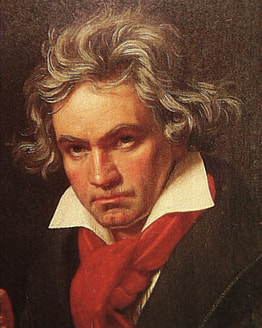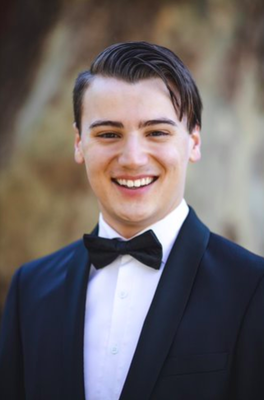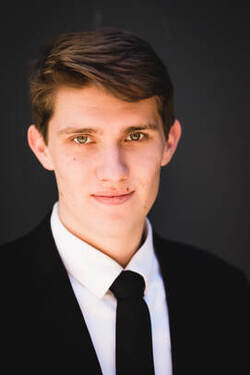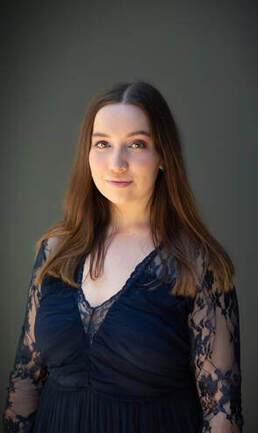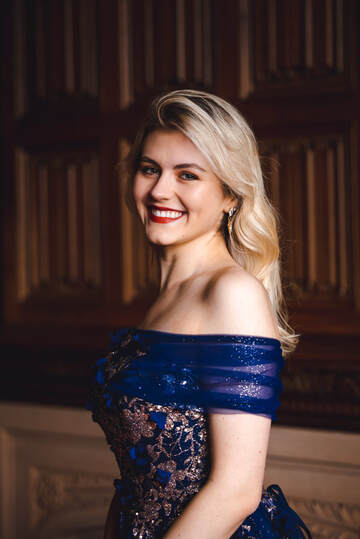Ludwig Van Beethoven
1770-1827
|
Ludwig Van Beethoven is one of the most influential composers in history. Bridging the transition between the Classical and Romantic eras, Beethoven’s compositions are influenced by the structures of Classical music traditions and embrace Romantic philosophies associated with the emerging Enlightenment movement. His ability to create works which appeal to the amateur and connoisseur alike is the reason why his compositions have remained to be some of the most celebrated works in the repertoire.
Along with his many compositions for instruments, Beethoven produced a large body of vocal works. Beethoven was highly skilled in combining words and music to create deeper expression and meaning in his compositions, likely inspired by his romantic sensibilities. This is evident in his Lieder, particularly in those with texts written by Goethe, about which Beethoven remarked: “[Goethe’s texts] exert a great power over me, not only for their content but also because of their rhythms. I am stimulated to compose by this language, which builds itself into higher spheres as if through spiritual means and carries in itself the secret of harmonies.” These works, which are a culmination of Beethoven’s musical genius and reverent treatment of poetry are celebrated in this year’s Demant Dreikurs competition for his 250th anniversary. |
Ludwig Van Beethoven ist einer der einflussreichsten Komponisten der Geschichte. Beethovens Kompositionen überbrückten den Übergang zwischen klassischer und romantischer Periode und wurden von den Strukturen klassischer Musiktraditionen beeinflusst. Sie umfassen romantische Philosophien, die mit der aufkommenden Aufklärungsbewegung verbunden sind. Seine Fähigkeit, Werke zu schaffen, die sowohl Amateur als auch Kenner ansprechen, ist der Grund, warum seine Kompositionen zu den berühmtesten Werken des Repertoires gehören.
Beethoven produzierte neben seinen zahlreichen instrumentalen Kompositionen eine Vielzahl von Vokalwerken. Er war sehr geschickt darin, Wörter und Musik zu kombinieren, um einen tieferen Ausdruck und eine tiefere Bedeutung in seinen Kompositionen zu erzeugen. Wahrscheinlich inspirierte ihn seine romantischen Sensibilität. Dies zeigt sich in seinen Liedern, insbesondere in denen mit Texten von Goethe, über die Beethoven bemerkte: “[Goethe’s Texte] üben eine große Macht über mich aus, nicht nur wegen ihres Inhalts, sondern auch wegen ihres Rhythmus.” Diese Werke, die einen Höhepunkt von Beethovens musikalischem Genie und ehrfurchtsvollem Umgang mit Poesie darstellen, werden im diesjährigen Demant Dreikurs Wettbewerb zu seinem 250-jährigen Jubiläum gefeiert. |
WINNER
Jeremy Boulton
Baritone
Former recipient of the Opera Australia Student Scholarship and graduate of the Talent Development Project, Jeremy has featured as a concert soloist for the Opera Australia Benevolent Fund, Sydney Conservatorium of Music (Early Music Ensemble), Argyle Orchestra (Hobart, Australia) and Opera Projects Sydney.
Jeremy has performed with Gondwana Choirs/The Muffat Collective as Aeneas in Dido & Æneas and with The Co-operative as the Secret Police Agent in The Consul.
Winner of the Margaret Olive Stewart Bequest Scholarship and the PATIM Fund Scholarship, Jeremy studies with Maree Ryan AM. In 2020, Jeremy received artist assistance from the Sidney Myer Fund & The Myer Foundation's National Assistance Program. Masterclasses include that by Jessica Pratt.
Jeremy is a Certificate Member (Arranger & Copyist) of the Music Arrangers’ Guild of Australia (M.A.G.A.) and an Ambassador for ClassikON. He is also the Manager of APRA Art Music Award Winning ensemble, Steel City Strings Chamber Orchestra.
Jeremy has performed with Gondwana Choirs/The Muffat Collective as Aeneas in Dido & Æneas and with The Co-operative as the Secret Police Agent in The Consul.
Winner of the Margaret Olive Stewart Bequest Scholarship and the PATIM Fund Scholarship, Jeremy studies with Maree Ryan AM. In 2020, Jeremy received artist assistance from the Sidney Myer Fund & The Myer Foundation's National Assistance Program. Masterclasses include that by Jessica Pratt.
Jeremy is a Certificate Member (Arranger & Copyist) of the Music Arrangers’ Guild of Australia (M.A.G.A.) and an Ambassador for ClassikON. He is also the Manager of APRA Art Music Award Winning ensemble, Steel City Strings Chamber Orchestra.
Der Tambour
From Mörike Lieder, IHW 22 (1888)
Hugo Wolf (1860-1903)
From Mörike Lieder, IHW 22 (1888)
Hugo Wolf (1860-1903)
Fifty-three of Mörike’s poems were set to music by Wolf; all of them setting various scenes and stories. The fifth in Wolf’s famous Mörike-Lieder tells the story of a drummer-boy who is dreaming of home. Being sent to war in France, the drummer-boy longs for Germany. The piano takes the role of the military march, and although the third verse is triumphant in mood, the drummer-boy ultimately still misses his mother.
|
Der Tambour
Text - Eduard Mörike (1804-1875) Wenn meine Mutter hexen könnt’, Da müsst’ sie mit dem Regiment Nach Frankreich, überall mit hin, Und wär’ die Marketenderin. Im Lager wohl um Mitternacht, Wenn Niemand auf ist als die Wacht, Und alles schnarchet, Ross und Mann, Vor meiner Trommel säss’ ich dann: Die Trommel müsst’ eine Schüssel sein; Ein warmes Sauerkraut darein; Die Schlegel, Messer und Gabel, Eine lange Wurst mein Sabel, Mein Tschako wär’ ein Humpen gut, Den füll’ ich mit Burgunderblut. Und weil es mir an Lichte fehlt, Da scheint der Mond in mein Gezelt: Scheint er auch auf franzö’sch herein, Mir fällt doch meine Liebste ein: Ach weh! Jetzt hat der Spass ein End! —Wenn nur meine Mutter hexen könnt’! |
The Drummer Boy
If my mother could work magic She’d have to go with the regiment To France, everywhere with them, And be the canteen-woman In camp, at midnight, When no one’s up save the guard, And everybody, man and horse, is snoring, Then I’d sit by my drum: The drum would be a bowl, With warm sauerkraut in it, The drumsticks would be a knife and fork, My sabre – a long sausage; My shako would be a tankard Filled with red Burgundy. And because I lack light, The moon shines into my tent; And though it shines in French, It still reminds me of my beloved: Oh dear! There’s an end to my fun! – If only my mother could work magic! Translation © Richard Stokes, author of The Book of Lieder, (Faber), “Der Tambour”, Oxford Lieder, 2020. https://www.oxfordlieder.co.uk/song/1543 |
Der Doppelgänger
From Schwanengesang, D.957 (1828)
Franz Schubert (1797-1828)
From Schwanengesang, D.957 (1828)
Franz Schubert (1797-1828)
This lied is part of Schubert’s Schwanengesang which was published after Schubert’s death in 1828. The minimal piano part plays a repeated harmonic progression as the horrible story unfolds. A man who has lost his beloved comes across someone standing outside of her house, suffering. He realises that the man is his own doppelgänger, there to remind him of his anguish.
|
Der Doppelgänger
Text - Heinrich Heine (1797-1856) Still ist die Nacht, es ruhen die Gassen, In diesem Hause wohnte mein Schatz; Sie hat schon längst die Stadt verlassen, Doch steht noch das Haus auf demselben Platz. Da steht auch ein Mensch und starrt in die Höhe, Und ringt die Hände, vor Schmerzens Gewalt; Mir graust es, wenn ich sein Antlitz sehe – Der Mond zeigt mir meine eigne Gestalt. Du Doppelgänger! Du bleicher Geselle! Was äffst du nach mein Liebesleid, Das mich gequält auf dieser Stelle, So manche Nacht, in alter Zeit? |
The Double
The night is still, the streets are at rest; in this house lived my sweetheart. She has long since left the town, but the house still stands on the same spot. A man stands there too, staring into the heights, and wringing his hands out of deep anguish; It terrifies me when I see his face – the moon shows me my own form! You ghostly double, pale companion, why do you ape the pain of my love, which tormented me on this very spot, so many a night, in days long past? Translation © Richard Wigmore, author of Schubert: The Complete Song Texts, (Schirmer Books). |
Der Kuss, Op.128 (1822)
Ludwig van Beethoven (1770-1827)
Ludwig van Beethoven (1770-1827)
Beethoven set Christian Weiße’s humorous poem to music in 1822, although it was not published until later due to publishers believing it to be too short. In true lieder fashion, Beethoven utilises the piano role effectively. The singer recounts his experience with Chloe, a girl he wishes to kiss. And the piano follows the emotions – from innocent light-hearted fun, to triumph once he kisses her. After the singer asks “And did she scream?” the piano repeats the line with embellishments. Both the singer and the pianist are in on the joke, leading up to the delivery of the final line.
|
Der Kuss
Text - Christian Felix Weiße (1726-1804) Ich war bei Chloen ganz allein, Und küssen wollt' ich sie. Jedoch sie sprach, sie würde schrein, Es sei vergebne Müh! Ich wagt' es doch und küßte sie, Trotz ihrer Gegenwehr. Und schrie sie nicht? Jawohl, sie schrie, Doch lange hinterher. |
The Kiss
I was with Chloe all alone, And wished to kiss her: But she said she would scream, That it would be in vain. But I dared to and kissed her, Despite her resistance. And did she scream? Oh yes, she screamed. But not until long after. Translation © Richard Stokes, author of The Book of Lieder, (Faber). |
Finalists
Aidan O'Donnell
Bass-Baritone
Currently in his third year of studies for classical voice, Aidan has had a passion for music and in particular singing from a young age as he joined the school choir at Newington College from primary school all throughout High School. This passion for choral singing has only magnified in Aidan as he is currently a bass choral scholar at St James King Street. As well as choral singing, Aidan’s interest in solo classical voice has only grown after high school. Through the guidance of his teacher Andrew Dalton, Aidan has grown fond of lieder by the likes of Brahms and Schumann, and most of all Schubert. This infatuation with lieder was further fostered when he attended the Melbourne international festival for lieder and art song in 2019 conducted by Professor Graham Johnson. Some of his favourite recordings include that of ‘Lied eines Schiffers an die Dioskuren’ and ‘Am Bach im Frühling’ sung by Matthias Goerne. Aidan is very appreciative of the opportunity to perform here today along with his peers.
Auf der Donau, D.553; Op.21 (1817)
Franz Schubert (1797-1828)
Franz Schubert (1797-1828)
Schubert composed Auf der Donau aged twenty, with text from a close friend of three years (and housemate) Johann Baptist Mayrhofer. The poem portrays a journey by boat along the Danube, on which the environment which sparks within the persona an increasing fear at the short-lived impact of human life. The music matches this sense of intense questioning, opening with a rolling accompaniment, which quickly turns much darker and more confrontational. Like many of Mayrhofer’s poems, a humanist outlook on the world and a sense of patriotism are central themes.
|
Auf der Donau
Text - Johann Mayrhofer (1787-1836) Auf der Wellen Spiegel schwimmt der Kahn, Alte Burgen ragen himmelan, Tannenwälder rauschen geistergleich, Und das Herz im Busen wird uns weich. Denn der Menschen Werke sinken all’, Wo ist Turm, wo Pforte, wo der Wall, Wo sie selbst, die Starken, erzgeschirmt, Die in Krieg und Jagden hingestürmt? Trauriges Gestrüppe wuchert fort, Während frommer Sage Kraft verdorrt: Und im kleinen Kahne wird uns bang, Wellen drohn wie Zeiten Untergang. |
On the Danube
The boat glides on the mirror of the waves; old castles soar heavenwards, pine forests stir like ghosts, and our hearts grow faint within our breasts. For the works of man all perish; where now is the tower, the gate, the rampart? Where are the mighty themselves, in their bronze armour, who stormed forth to battle and the chase? Mournful brushwood grows rampant while the power of pious myth fades. And in our little boat we grow afraid; waves, like time, threaten doom. English Translation © Richard Wigmore |
Sehnsucht. WoO 134 No.4 (1808)
Ludwig van Beethoven (1770-1827)
Ludwig van Beethoven (1770-1827)
Completed in 1808, and premiered in Vienna two years later, Sehnsucht lies in the middle of Beethoven's compositional output. The work consists of four short settings of the poem, each last around one minute, and in many ways the settings are similar in tempo and character. Three of the settings are in the same minor key, but the third, perhaps most gentle fragment moves to a major key, giving a contrasting perspective on the topic. Beethoven composed two other songs with this topic and title in a reasonably similar period, leaving listeners to wonder what he may have been longing for. Beethoven famously wrote a letter addressed to "The Immortal Beloved" which survived after his death, and the topic of which was adapted into a 1994 film. Could this setting give some clues to Beethoven's inmost feelings?
|
Sehnsucht
Text – Johann Wolfgang von Goethe (1749-1832) Nur wer die Sehnsucht kennt weiss, was ich leide! Allein und abgetrennt von aller Freude, Seh’ ich an’s Firmament nach jener Seite. Ach! Der mich liebt und kennt ist in der Weite. Es schwindelt mir, es brennt mein Eingeweide. Nur wer die Sehnsucht kennt weiss, was ich leide! |
Longing
Only the Yearning, they Know what I suffer! Alone, and far away From all joy severed, Seeing the sky always On every side. Who love me and know me, they Distantly hide. I’m dizzied: I’m burned, all day Inwardly shudder. Only the Yearning, they Know what I suffer! https://www.poetryintranslation.com/PITBR/German/Goethepoems.php#anchor_Toc74652103 |
Der Sieg, D.805 (1824)
Franz Schubert (1797-1828)
Franz Schubert (1797-1828)
In many ways, Der Sieg is a beautiful celebration of life - full of romantic ideals, rich in its natural imagery; dreamy, and nostalgic. However, it is the suffering which preceded this
victory which gives the poem, and therefore the work, its most profound beauty. "He had always written very beautiful music", writes cellist Stephen Isserlis , but as he got older, it went beyond beauty...there was a terrible sadness behind it. [...] All great composers wrote music that could be described as "heavenly", but the others have to take you there. With Schubert's music you hear the very first notes, and you know that you're there already."
victory which gives the poem, and therefore the work, its most profound beauty. "He had always written very beautiful music", writes cellist Stephen Isserlis , but as he got older, it went beyond beauty...there was a terrible sadness behind it. [...] All great composers wrote music that could be described as "heavenly", but the others have to take you there. With Schubert's music you hear the very first notes, and you know that you're there already."
|
Der Sieg
Text - Johann Mayrhofer (1787-1836) O unbewölktes Leben! So rein und tief und klar! Uralte Träume schweben Auf Blumen wunderbar. Der Geist zerbrach die Schranken, Des Körpers träges Blei; Er waltet gross und frei. Es laben die Gedanken An Edens Früchten sich; Der alte Fluch entwich. Was ich auch je gelitten, Die Palme ist erstritten, Gestillet mein Verlangen. Die Musen selber sangen Die Schlang’ in Todesschlaf, Und meine Hand, sie traf. |
Victory
O unclouded life, so pure, so deep and clear! Age-old dreams float miraculously over the flowers. The spirit broke the fetters of the body’s inert leaden mass; it roams great and free. The mind is refreshed by the fruits of Paradise; the ancient curse is no more. Whatever I may have suffered, the palm is now won and my longing stilled. The Muses themselves sang the snake to the sleep of death, and my hand struck the blow. Wigmore, Richard. "Der Sieg." Oxford Lieder. Accessed August 12. https://www.oxfordlieder.co.uk/song/2989 |
Laura Wachsmann
Soprano
Laura is in her third year at the Sydney Conservatorium of Music under the tutelage of Narelle Yeo. In 2020 she was awarded the Greenberg-Gurney-Jensen Fund 2 Scholarship to assist with her studies. Laura grew up in a choral background, and 2019 marked Laura's operatic debut. She played 'Second Woman' in Purcell's Dido and Aeneas (The Other Theatre Co.) and 'Coridon' in Handel's Acis and Galatea (Ensemble Polyphème). Laura was also a chorus member for the Sydney Symphony Orchestra's semi-staged production of Britten's Peter Grimes, as well as Ravel's opera L’enfant et les sortilèges (Sydney Conservatorium of Music). This year, she played 'John Sorel' in a re-imagined production of Menotti's The Consul (The Cooperative). Laura has also performed as a soloist for Joubert Singers in Charpentier’s ‘Messe de minuit de Noel’, along with Pergolesi/Durante's ‘Magnificat’ and Mozart’s ‘Vespers’.
Verschwiegene Liebe
From Eichendorff Lieder (1886)
Hugo Wolf (1860-1903)
From Eichendorff Lieder (1886)
Hugo Wolf (1860-1903)
Based on a poem by Josef Karl Benedict von Eichendorff, this intimate song by Hugo Wolf paints a romanticized picture of a secret love that is hidden under the night sky. This strophic song is characterized by the musical indication of “Sanfte Bewegung und immer sehr zart" (smooth motion and very delicate), which allows for the creation of a mysterious setting full of love, wonder and emotional liberation.
|
Verschwiegene Liebe
Text - J. K. B Eichendorff (1788-1857) Über Wipfel und Saaten In den Glanz hinein - Wer mag sie erraten, Wer holte sie ein? Gedanken sich wiegen, Die Nacht ist verschwiegen, Gedanken sind frei. Errät' es nur eine, Wer an sie gedacht Beim Rauschen der Haine, Wenn niemand mehr wacht Als die Wolken, die fliegen - Mein Lieb ist verschwiegen Und schön wie die Nacht. |
Silent Love
Over treetops and crops And into the splendor - Who may guess them, Who may catch up with them? Thoughts sway, The night is mute; Thoughts run free. If only she would guess Who was thinking of her By the rustling of the grove, When no one was watching any longer Except the clouds that flew by - [but] my love is silent And as fair as the night. Stokes, R. (2020). Verschwiegene Liebe. [online] Oxford Lieder. Available at: https://www.oxfordlieder.co.uk/song/1759 [Accessed 5 Aug. 2020]. |
Er It's
From Mörike-Lieder, IHW 22 (1888)
Hugo Wolf (1860-1903)
From Mörike-Lieder, IHW 22 (1888)
Hugo Wolf (1860-1903)
Wolf’s “Er Ist’s” utilizes Eduard Mörike’s text beautifully to paint a glorious picture of spring, in which multiple senses are drawn upon to emulate the experience that the season brings. Starting off with the sense of sight, Wolf utilizes a light and delicate introduction to accompany the visual imagery “Frühling lässt sein blaues Band” (Spring is floating its blue banner) to illustrate the jubilance, followed by the sense of smell which creates a sense of wonderful nostalgia. The sense of smell as displayed in “Horch, ein Harfenton!” (Listen, the sound of a harp!) further perpetuates the sensational experience of springtime. True to Wolf’s form, this piece places equal emphasis on both the vocal line as well as the piano to collaboratively create a joyous atmosphere.
|
Er Ists!
Text - Eduard Mörike (1804-1875) Frühling lässt sein blaues Band Wieder flattern durch die Lüfte; Süße, wohlbekannte Düfte Streifen ahnungsvoll das Land. Veilchen träumen schon, Wollen balde kommen. Horch, ein Harfenton! Frühling, ja du bist’s! Dich hab ich vernommen! |
He is!
Spring is floating its blue banner On the breezes again; Sweet, well-remembered scents Drift portentously across the land. Violets, already dreaming, Will soon begin to bloom. Listen, the sound of a harp! Spring, it must be you! It’s you I’ve heard! Stokes, R. (2019). Er ist’s. [online] Oxford Lieder. Available at: https://www.oxfordlieder.co.uk/song/597 [Accessed 5 Aug. 2020]. |
An die Hoffnung, Op. 94 (1804)
Ludwig van Beethoven (1770-1827)
Ludwig van Beethoven (1770-1827)
This song is Beethoven’s second setting of the text by Christoph August Tiedge, in which he sophisticatedly sheds light onto the universal human experience of hope. The notion of hope as a catalyst for strong human emotion is mirrored through this strophic song that is characterized by modal changes. Like the human emotion of hope, the modality goes through a journey of optimistic major sections, interspersed with darker moments of minor modality. The flexible tempo throughout the song further supports this idea by creating divergence, specifically when we come into the second stanza from the first, as the allegro affirmation “Hoffen soll der Mensch” (Man must hope) is contrasted by the flowing triplets that accompany the second stanza.
|
An die Hoffnung
Text - Christoph August Tiedge (1752-1841) Ob ein Gott sei? Ob er einst erfülle, Was die Sehnsucht weinend sich verspricht? Ob, vor irgendeinem Weltgericht, Sich dies rätselhafte Sein enthülle? Hoffen soll der Mensch! Er frage nicht! Die du so gern in heil'gen Nächten feierst Und sanft und weich den Gram verschleierst, Der eine zarte Seele quält, O Hoffnung! Laß, durch dich empor gehoben, Den Dulder ahnen, daß dort oben Ein Engel seine Tränen zählt! Wenn, längst verhallt, geliebte Stimmen schweigen; Wenn unter ausgestorb'nen Zweigen Verödet die Erinn'rung sitzt: Dann nahe dich, wo dein Verlaßner trauert Und, von der Mitternacht umschauert, Sich auf versunk'ne Urnen stützt. Und blickt er auf, das Schicksal anzuklagen, Wenn scheidend über seinen Tagen Die letzten Strahlen untergehn: Dann laß' ihn um den Rand des Erdentraumes Das Leuchten eines Wolkensaumes Von einer nahen Sonne seh'n! |
To Hope
Is there a God? Will he someday fulfill The promises for which longing cries out? Will, before the court of the world, This puzzle ever reveals itself? Man must hope. He does not ask! You, who so gladly celebrates on sacred nights And gently and softly veils the grief That torments a tender soul, O Hope! Raised through you, Let the sufferer feel that there above, An angel counts his tears! When, long hushed, beloved voices are silenced, When, underneath dead branches Memory sits desolate, Then come closer to where your forsaken one mourns And, looking around at midnight, Supports himself against sunken urns. And if he looks up to accuse Fate, When, departing with his days, The last rays set: Then permit him to see, at the rim of this earthly dream, The light of the cloud's hem From the near-by sun! To Hope (Tiedge, set by (Ludwig van Beethoven, Friedrich Heinrich Himmel)) (The LiederNet Archive: Texts and Translations to Lieder, mélodies, canzoni, and other classical vocal music). https://www.lieder.net/lieder/get_text.html?TextId=15806 |
Alexander Young
Tenor
Born in Prague, in the Czech Republic, Alexander Young developed his love for singing from an early age. On the day he was brought back from the hospital, his grandfather heard him cry for the first time and swiftly proclaimed “yep, he’s going to be a singer!” Indeed, much of Alex’s early musical inspiration and connection came from his grandfather, who himself sang opera in his youth, and performed in the chorus at La Scala in a production of Lohengrin, a stage to which Alex would love to find himself following in his grandfather’s footsteps. Alex has enjoyed performing in a myriad of styles and settings; be it as a cat in a year 2 production of Andrew Lloyd Webber’s aptly named “Cats”, to his first singing concert at Mozart’s Villa in Prague, to musical theatre and even jazz during high school, back to his continuous and ever-present love of Opera and classical singing. Alex hopes that his career will eventually take him around the globe, back to Europe and to Prague where his singing journey began, from Semperoper to La Scala, from Vienna Staatsoper back to the Sydney Opera House, and to all the great destinations of the world.
Neue Liebe, Neues Leben (1809)
Ludwig van Beethoven (1770-1827)
Ludwig van Beethoven (1770-1827)
Ludwig von Beethoven composed this setting of ‘Neue Liebe, Neues Leben’ in 1809 however he used the same poem for a lied he composed in 1798. Goethe wrote the poem about Lilli Schönemann, the daughter of a banker. They broke off their engagement after a year of difficulties due to the disapproval of both of their families. The personification of the singer’s heart emphasises that he is enslaved by his love for her, even though he knows it can never be.
|
Neue Liebe, Neues Leben
Text – Johann Wolfgang von Goethe (1749-1832) Herz, mein Herz, was soll das geben? Was bedränget dich so sehr? Welch ein fremdes, neues Leben! Ich erkenne dich nicht mehr. Weg ist alles, was du liebtest, Weg, warum du dich betrübtest, Weg dein Fleiß und deine Ruh – Ach, wie kamst du nur dazu! Fesselt dich die Jugendblüte, Diese liebliche Gestalt, Dieser Blick voll Treu und Güte Mit unendlicher Gewalt? Will ich rasch mich ihr entziehen, Mich ermannen, ihr entfliehen, Führet mich im Augenblick, Ach, mein Weg zu ihr zurück. Und an diesem Zauberfädchen, Das sich nicht zerreissen läßt, Hält das liebe, lose Mädchen Mich so wider Willen fest; Muß in ihrem Zauberkreise Leben nun auf ihre Weise. Die Verändrung, ach wie groß! Liebe, Liebe, laß mich los! |
New love, new life
Heart, my heart, what can this mean? What is it that besets you so? What a strange and new existence! I do not know you anymore. Fled is all you used to love, Fled is all that used to grieve you, Fled your work and peace of mind – Ah, how can this have come about! Does the bloom of youth ensnare you, This dear figure full of charm, These eyes so kind and faithful With inexorable power? When I try to hasten from her, Control myself, escape her, In a moment I am led, Ah, back to her again. And by this magic little thread That cannot be severed, The sweet and playful girl Holds me fast against my will; In her enchanted realm I must now live as she dictates. Ah, what a monstrous change! Love! Love! Let me free! Stokes, Richard. 2005. "Neue Liebe, Neues Leben". Oxford Lieder. https://www.oxfordlieder.co.uk/song/1516. |
Und willst du deinen Liebsten sterben sehen (1892)
From Italienisches Liederbuch (1892-96)
Hugo Wolf (1860-1903)
From Italienisches Liederbuch (1892-96)
Hugo Wolf (1860-1903)
Hugo Wolf composed ‘Und Willst du Deinen Liebsten Sterben Sehen’ in 1891 as the 17th song in his lieder collection Italienisches Liederbuch. This collection of songs uses poetry from Italian folksongs translated into German by Paul Heyse. By the end of 1991, Wolf had composed 22 lieder for this project however had to stop for five years due to ill psychological health. He wrote the other 24 songs in this collection over the span of a month in 1896. Wolf commented on his Italienisches Liederbuch, claiming that it was "the most original and artistically perfect of all my works”.
|
Und Willst du Deinen Liebsten Sterben Sehen
Text – Paul Heyse (1830-1914) Und willst du deinen Liebsten sterben sehen, So trage nicht dein Haar gelockt, du Holde. Lass von den Schultern frei sie niederwehen; Wie Fäden sehn sie aus von purem Golde. Wie goldne Fäden, die der Wind bewegt – Schön sind die Haare, schön ist, die sie trägt! Goldfäden, Seidenfäden ungezählt, Schön sind die Haare, schön ist, die sie strählt! |
And if you would see your lover die
And if you would see your lover die, Do not wear your hair in tresses, my love. Let it cascade from your shoulders; It looks like threads of pure gold. Like golden threads blown by the wind – The hair is beautiful, beautiful she that wears it! Golden threads, silken threads without number, The hair is beautiful, beautiful she who combs it! (translation by Stokes, Richard. 2005. "Und Willst Du Deinen Liebsten Sterben Sehen". Oxford Lieder. https://www.oxfordlieder.co.uk/song/1628) |
Nimmersatte Liebe
From Mörike Lieder, IHW 22 (1888)
Hugo Wolf (1860-1903)
From Mörike Lieder, IHW 22 (1888)
Hugo Wolf (1860-1903)
This poem was written by German Lutheran Pastor Eduard Mörike. The persona of the poem declares that his love cannot be satisfied with mere kisses... quite a promiscuous subject matter for Mörike, a man of the church. Wolf finished composing the song on February 24, 1888, and he wrote to his friend Edmund Lang claiming that “when he heard it, the Devil would seize him with pleasure”. In the final stanza of the poem, Mörike references the biblical figure Solomon who is infamous for his reputation with women with his 700 wives and 300 concubines. The poem declares that even “wise old Solomon” loved in a similarly passionate way to the persona in the poem and therefore these feelings transcend time.
|
Nimmersatte Liebe
Text – Eduard Mörike (1804-1875) So ist die Lieb! So ist die Lieb! Mit Küssen nicht zu stillen: Wer ist der Tor und will ein Sieb Mit eitel Wasser füllen? Und schöpfst du an die tausend Jahr, Und küssest ewig, ewig gar, Du tust ihr nie zu Willen. Die Lieb, die Lieb hat alle Stund Neu wunderlich Gelüsten; Wir bissen uns die Lippen wund, Da wir uns heute küssten. Das Mädchen hielt in guter Ruh, Wie’s Lämmlein unterm Messer; Ihr Auge bat: „Nur immer zu! Je weher, desto besser!“ So ist die Lieb! und war auch so, Wie lang es Liebe gibt, Und anders war Herr Salomo, Der Weise, nicht verliebt. |
Insatiable Love
Such is love! Such is love! Not to be quieted with kisses: What fool would wish to fill a sieve With nothing else but water? And were you to draw water for some thousand years, And were you to kiss for ever and ever, You’d never satisfy love. Love, love, has every hour New and strange desires; We bit until our lips were sore, When we kissed today. The girl kept nicely quiet and still, Like a lamb beneath the knife; Her eyes pleaded: “Go on, go on! The more it hurts the better!” Such is love! and has been so As long as love’s existed, And wise old Solomon himself Was no differently in love. Stokes, Richard. 2005. "Nimmersatte Liebe". Oxford Lieder. https://www.oxfordlieder.co.uk/song/1562. |
Olivia Payne
Mezzo-Soprano
Olivia is a mezzo-soprano in her final year of studying a Bachelor of Music Performance at the Conservatorium. To date, Olivia has performed in Carmen, Don Giovanni and L’enfants et les sortilèges as well as numerous charity benefits and community concerts. In 2017, she branched into music for film, forming part of the Christmas Choir in Bruce Beresfords film, ‘Ladies in Black.’ Olivia has also been involved in recordings, most notably for the Australian Government in their Healthy Aging Campaign. She has performed competitively in regional and Sydney Eisteddfods and was awarded a distinction in her ATCL Diploma from the Trinity College of London. Olivia is really excited to be a finalist in the 2020 Demant Dreikurs German Song Contest.
Lied an der Mignon
From 4 Gesänge aus ‘Wilhelm Meister’, D.877 (1826)
Franz Schubert (1797-1828)
From 4 Gesänge aus ‘Wilhelm Meister’, D.877 (1826)
Franz Schubert (1797-1828)
This piece is based on Goethe's famous novel Wilhelm Meister. Within the novel, the character Mignon is full of song, and inspired Schubert to do many settings of songs based on her story, hence the title “Song of Mignon.” In 1827, publisher Antonio Diabelli released four of these "Mignon Songs" as Schubert's Opus 62 (now cataloged as D. 877). The last song in the group is a setting of the poem "Nur wer die Sehnsucht kennt." Like the other three songs of the opus, it was probably composed during January 1826. As fate would have it, these four Lieder are the last settings of Goethe's words that Schubert would ever make. In this piece, Mignon tells us of her great loneliness, but it is the solo piano that seems to explore most deeply the painful, and in this case dissonant, reality of solitude.
|
Lied der Mignon
Text – Johann Wolfgang von Goethe (1749-1832) Nur wer die Sehnsucht kennt Weiss, was ich leide! Allein und abgetrennt Von aller Freude, Seh’ ich an’s Firmament Nach jener Seite. Ach! der mich liebt und kennt Ist in der Weite. Es schwindelt mir, es brennt Mein Eingeweide. Nur wer die Sehnsucht kennt Weiss, was ich leide! |
Song of Mignon
Only he who knows longing knows what I suffer. Alone, cut off from all joy, I gaze at the firmament in that direction. Ah, he who loves and knows me is far away. I feel giddy, my vitals are aflame. Only he who knows longing knows what I suffer. Translation by Richard Wigmore, first published by Gollancz and reprinted in the Hyperion Schubert Song Edition. |
Elfenlied
From Mörike-Lieder, IHW 22 (1888)
Hugo Wolf (1860-1903)
From Mörike-Lieder, IHW 22 (1888)
Hugo Wolf (1860-1903)
"Elfenlied" (Elf Song) is a poem written by Eduard Mörike at some point between 1826 and early 1828, first published in 1832. It was adapted into a Lied by Wolf between February and November 1888, as one of 53 songs in the Mörike-Lieder collection. The poem is simple enough, telling the story of an elf who wanders into a village late at night. Curious about the people living in the village, he goes to get a closer look at their houses and ultimately hits his head, leaving him dazed on the ground. The poem utilises a German pun right at the beginning. The word "Elf" is used to represent the number 11, but "Elfe" is used to refer to an elf. The pronunciation of the two are similar, hence causing the elf to believe those in the village are calling for him.
|
Elfenlied
Text – Eduard Mörike (1804-1875) Bei Nacht im Dorf der Wächter rief: "Elfe!" Ein ganz kleines Elfchen im Walde schlief – Wohl um die Elfe – Und meint, es rief ihm aus dem Tal Bei seinem Namen die Nachtigall, Oder Silpelit hätt ihm gerufen. Reibt sich der Elf die Augen aus, Begibt sich vor sein Schneckenhaus, Und ist als wie ein trunken Mann, Sein Schläflein war nicht voll getan, Und humpelt also tippe tapp Durchs Haselholz ins Tal hinab, Schlupft an der Mauer hin so dicht, Da sitzt der Glühwurm, Licht an Licht. „Was sind das helle Fensterlein? Da drin wird eine Hochzeit sein: Die Kleinen sitzen beim Mahle, Und treibens in dem Saale; Da guck ich wohl ein wenig ’nein!“ – Pfui, stösst den Kopf an harten Stein! Elfe, gelt, du hast genug? Gukuk! Gukuk! |
Elf Song
The village watch cried out at night: “Eleven!” An elfin elf was asleep in the wood – Just at eleven – And thinks the nightingale was calling Him by name from the valley, Or Silpelit had sent for him. The elf rubs his eyes, Steps from his snail-shell home, Looking like a drunken man, Not having slept his fill, And hobbles down, tippety tap, Through the hazels to the valley, Slips right up against the wall, Where the glow-worm sits, shining bright. “What bright windows are these? There must be a wedding inside: The little folk are sitting at the feast And skipping round the ballroom; I’ll take a little peek inside!” Shame! he hits his head on hard stone! Elf, don’t you think you’ve had enough? Cuckoo! Cuckoo! Translation by Richard Stokes, author of The Book of Lieder (Faber, 2005). |
Wonne der Wehmut
From 3 Gesänge, Op. 83 (1810)
Ludwig van Beethoven (1770-1827)
From 3 Gesänge, Op. 83 (1810)
Ludwig van Beethoven (1770-1827)
Composed in 1810 and published in 1815 as the first movement of Beethoven’s 3 Gesänge, Opus 83, this piece finds Beethoven at his most poetically subtle, with an effect of “falling tears” being created in the piano accompaniment. The constant breaks in the vocal line allow the piano to ponder further on what is being sung, with a major-key setting perfectly encapsulating the poem’s central theme of finding joy through sadness. The poem Beethoven has set was written by Goethe in 1775, when he was 26 years old.
|
Wonne der Wehmut
Text – Johann Wolfgang von Goethe (1749-1832) Trocknet nicht, trocknet nicht, Tränen der ewigen Liebe! Ach, nur dem halbgetrockneten Auge Wie öde, wie tot die Welt ihm erscheint! Trocknet nicht, trocknet nicht, Tränen unglücklicher Liebe! |
Delight in Melancholy
Do not grow dry, do not grow dry, tears of eternal love! Ah, even when the eye is but half dry how desolate, how dead the world appears! Do not grow dry, do not grow dry, tears of unhappy love! “Wonne der Wehmut (1815).” Oxford Lieder, 2020. https://www.oxfordlieder.co.uk/song/3172. |
Alexander Caldwell
Tenor
Alexander is currently in his third year at the Conservatorium. Coming from a predominantly theatre-based background, roles include Gepetto in Pinocchio, an original opera staged by Musgrove Opera, Enoch Snow in Rodger’s and Hammerstein’s Carousel, Wayne Burns in Strictly Ballroom, Jimmy Powers in City of Angels and a variety of chorus roles in opera and musical theatre productions across Sydney. On the concert stage, Alexander has appeared as a soloist in Charpentier’s Christmas Mass and Durante’s Magnificat with the Joubert Singers, Vaughan Williams Mass in G Minor at Christchurch St Laurence, Bell Piece by Percy Grainger with the SCM Wind Symphony and most recently in the Con’s virtual production of Mozart’s Requiem. Alexander has performed in ensemble groups including The Song Company, the SCM Chamber Choir and as a soloist in the Icelandic Project Ensemble, which premiered a selection of contemporary Icelandic choral music in Australia.
Verborgenheit
From Mörike-Lieder, IHW 22 (1888)
Hugo Wolf (1860-1903)
From Mörike-Lieder, IHW 22 (1888)
Hugo Wolf (1860-1903)
One of Hugo Wolf’s most popular songs, “Verborgenheit” — which might be translated as either seclusion or withdrawal — is atypical of the composer's style. Beginning and ending identically, Wolf transports the listener on an emotional journey, moving from the first stanza’s pervading sense of withdrawal to a more agitated, questioning mood. A key shift follows, leading into the third section, which transitions from a deeply inward feeling to a radiant, yet controlled climax on the word ‘wonniglich’ (rapture) before receding into ‘in meiner brust’ (to my breast). Concluding with the same melancholic sighs of the first stanza, “Verborgenheit” can provide a moment of revelatory introspection, a drawing to the surface of feelings usually too far within to be articulated.
|
Verborgenheit
Text - Eduard Mörike (1804-1875) Lass, o Welt, o lass mich sein! Locket nicht mit Liebesgaben, Lasst dies Herz alleine haben Seine Wonne, seine Pein! Was ich traure, weiss ich nicht, Es ist unbekanntes Wehe; Immerdar durch Tränen sehe Ich der Sonne liebes Licht. Oft bin ich mir kaum bewusst, Und die helle Freude zücket Durch die Schwere, so mich drücket Wonniglich in meiner Brust. Lass, o Welt, o lass mich sein! Locket nicht mit Liebesgaben, Lasst dies Herz alleine haben Seine Wonne, seine Pein! |
Seclusion
Let, O world, O let me be! Do not tempt with gifts of love, Let this heart keep to itself Its rapture, its pain! I do not know why I grieve, It is unknown sorrow; Always through a veil of tears I see the sun’s beloved light. Often, I am lost in thought, And bright joy flashes Through the oppressive gloom, Bringing rapture to my breast. Let, O world, O let me be! Do not tempt with gifts of love, Let this heart keep to itself Its rapture, its pain! “Verborgenheit.” Oxford Lieder, 2020. https://www.oxfordlieder.co.uk/song/1565 |
Der Kuss, Op.128 (1822)
Ludwig van Beethoven (1770-1827)
Ludwig van Beethoven (1770-1827)
“Der Kuß” was the last of Beethoven’s songs to be published. Christian Felix Weisse's poem is a humorous tale of man's pursuit of female ‘companionship’, and Beethoven's setting cleverly evokes the man's unfolding story. As he overcomes Chloe's resistance, the music moves to the dominant key, creating more tension. When the persona asks the listener, ‘And did she scream?’ Beethoven reduces the formerly lively tempo to a cheeky Adagio, and sets up the final punchline by imitating the tune in the piano part. At ‘Yes, she screamed,’ the original tempo resumes, and at ‘but not until long after,’ Beethoven certainly has the last laugh, instructing the singer to deliver the punchline ‘with a smile’.
|
Der Kuss
Text - Christian Felix Weiße (1726-1804) Ich war bei Chloen ganz allein, Und küssen wollt' ich sie. Jedoch sie sprach, sie würde schrein, Es sei vergebne Müh! Ich wagt' es doch und küßte sie, Trotz ihrer Gegenwehr. Und schrie sie nicht? Jawohl, sie schrie, Doch lange hinterher. |
The Kiss
I was with Chloe all alone, And wished to kiss her: But she said she would scream, That it would be in vain. But I dared to and kissed her, Despite her resistance. And did she scream? Oh yes, she screamed. But not until long after. Translation © Richard Stokes, author of The Book of Lieder, (Faber). |
Nacht und Träume, D.827 (1823)
Franz Schubert (1797-1828)
Franz Schubert (1797-1828)
In the contest for most beautiful, most rapturous, and most exalted song by Schubert, “Nacht und Träume” ranks near the top of every singer's, every critic's, and every listener's shortlist. Conflating two poems by Matthäus von Collin, Schubert's song is 29 bars of pure, distilled musical bliss. It moves at a ‘sehr langsam’ (very slow) tempo in majestic common time, and at a dynamic level that never rises above pianissimo. Collin’s eight lines of 59 syllables sail above the piano's gently swaying accompaniment in a vocal line of such inward ecstasy, of such inevitable nobility, that they seem more to fall like a blessing from God, than to have resulted from the compositional efforts of a mere mortal.
|
Nacht und Träume
Text - Matthäus von Collin (1779-1824) Heil’ge Nacht, du sinkest nieder; Nieder wallen auch die Träume, Wie dein Mondlicht durch die Räume, Durch der Menschen stille Brust. Die belauschen sie mit Lust; Rufen, wenn der Tag erwacht: Kehre wieder, heil’ge Nacht! Holde Träume, kehret wieder! |
Night and Dreams
Holy night, you sink down; dreams, too, float down, like your moonlight through space, through the silent hearts of men. They listen with delight, crying out when day awakes: come back, holy night! Fair dreams, return! “Nacht und Träume (1823).” Oxford Lieder, 2020. https://www.oxfordlieder.co.uk/song/4239. |
Reserve Finalists
Ella Coddington
Mezzo-Soprano
Mezzo-Soprano Ella Coddington is currently in her second year of classical voice performance at the Sydney Conservatorium of Music, studying under Barry Ryan OAM. In 2019 she was an awardee of the Patricia Lucas Music Achievement Award, and this year she currently receives the Costa Rosa Harsas Award Scholarship. Most recently, Ella performed in the role of Susie for a workshop production of David Reeves’ Ever the Best of Friends, and, prior to the lockdown, she was slated to perform the roles of Night and Juno in Concordia Ensemble’s now postponed inaugural production of Purcell’s Fairy Queen. Ella is also a co-founder of Concordia Ensemble, which she hopes to see generate new performance opportunities for undergraduate voice students at the Sydney Conservatorium. Ella was also a soloist at the first Con Lieder Series recital in 2019.
Natasha Gesto
Soprano
Natasha Isabella Gesto is a third-year classical voice student at the Sydney Conservatorium of Music and a recipient of the Helen Myers scholarship at the Conservatorium. Natasha’s musical journey began in Canberra at the Australian National University School of Music where she commenced her piano studies at age 6. Despite piano being the first instrument she formally studied, her love for singing always came first and she took every opportunity to perform until she began to formally study voice at age 10. Since then Natasha has performed in a range of ensembles. In 2020 Natasha was a soprano soloist in the Sydney Conservatorium’s performance of Mozart’s Requiem in D minor and she is currently a Soprano Scholar at St. Stephen’s Uniting Church. At the Sydney Eisteddfod in 2019, Natasha placed 1st in the coveted ‘Operatic Aria’ category and 2nd in ‘French Song’. Natasha has been involved in various opera productions during her time at the Conservatorium. Natasha played the lead role of ‘Francesca the Fox’ in the recent Australian opera ‘Pinocchio’, appearing on the ABC nationally televised breakfast show to promote the performance and more recently touring rural NSW with the operatic production. She has also played the role of ‘Une Chouette’ (the Owl) in the Sydney Conservatorium’s production of Ravel’s ‘L'enfant et les sortilèges’. Natasha hopes to further her academic studies of operatic performance overseas and travel the world performing.
Our COVID-19 Learning Experiences
2020 has brought about with many challenges and changes to our university studies. Our first year students worked together remotely to compile their experiences learning German during COVID-19 pandemic.
Check out their fantastic work below!
Check out their fantastic work below!
|
|
|
Watch the 2020 Competition Below
Acknowledgements
Many thanks to our:
Pianist
David Miller AM
Guests of Honour
German Consul General Peter Silberberg
Sonja Schweizer, President of the Australian German Welfare Society Sydney
Adjudicators
Head Adjudicator:
Barry Ryan OAM
Associated Adjudicators:
Andrew Dalton
Maree Ryan AM
Dr Anke Hoeppner-Ryan
Sonja Schweizer
Pianist
David Miller AM
Guests of Honour
German Consul General Peter Silberberg
Sonja Schweizer, President of the Australian German Welfare Society Sydney
Adjudicators
Head Adjudicator:
Barry Ryan OAM
Associated Adjudicators:
Andrew Dalton
Maree Ryan AM
Dr Anke Hoeppner-Ryan
Sonja Schweizer
